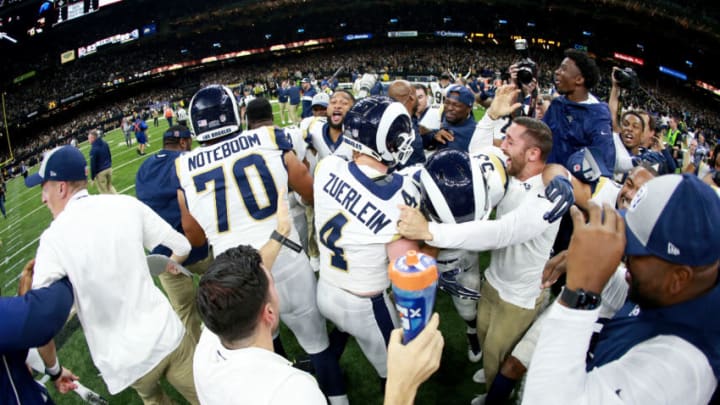The Los Angeles Rams were actually the first football team in Cleveland, which gives them a bit of a connection to our own Cleveland Browns football team
Most of today’s fans are aware that the Super Bowl LIII-bound Los Angeles Rams called St. Louis as their home from 1995 to 2015, but before the advent of the Cleveland Browns, the Rams called Cleveland their home.
The Cleveland Rams played in old League Park at 66th and Lexington in the Hough neighborhood of Cleveland from 1936 until 1945. They fled Cleveland for Los Angeles for the 1946 season, then moved to St. Louis from 1995 to 2015 before heading back to Los Angeles for the 2016 season.
The Browns and the All America Football Conference occupied the void left by the departure of the Rams. But make no mistake about it, the Rams were born in Cleveland, and in fact, they were World Champions in 1945, which was their last season in The Land.
More from Dawg Pound Daily
- How the Browns could maximize Nick Chubb in 2023
- Can Deshaun Watson get to Patrick Mahomes level for Cleveland Browns?
- 3 Cleveland Browns who should see an expanded role in 2023 and 1 who should not
- Is Marcus Davenport on the Browns radar in 2023?
- 5 Free agents from Super Bowl LVII Cleveland Browns should target
Many of the factors that led to the relocation of the Rams franchise from Cleveland to Los Angeles were also present in 1995 when promises of a sweeter stadium lease led the Browns franchise to move to Baltimore. If the City had learned from its mistakes with the Rams, perhaps the painful Baltimore relocation could have been averted. Of course, that did not happen, as learning from mistakes is not known to be a specialty of Cleveland politicians.
The Rams were founded in 1936, as a charter member of the American Football League, not to be confused with the league by the same name which was formed in 1960, and ultimately evolved into the American Football Conference (AFC) of the NFL.
At any rate, the 1936 Rams team managed a 5-2-2 record. However, the championship game with the Boston Shamrocks (you remember the Shamrocks, right?) never took place because the Shamrocks players were not getting paid. With such poor finances, it comes as no surprise that the league folded the next year.
The Rams players were not very memorable for the most part, but they did have a wide receiver named Sid Gillman, who grew up to be a pretty good coach for the Rams, Chargers, and Oilers.
After the 1936 season, the Cleveland Rams were admitted to the NFL. Their modus operandi resembled the 1999 Browns, as they won only one game in 1937. Dan Reeves (not related to Dan Reeves the coach of the Broncos and Falcons) purchased the team in 1941, and the team struggled through the war years, even suspending operations in 1943 when the owner was drafted into the army.
But in 1945, the Rams drafted quarterback Bob Waterfield in the fifth round. That year he was the NFL’s most valuable player and led the team to the World Championship. The World Championship was played in Cleveland in -8 Fahrenheit temperatures against Sammy Baugh and the perennially powerful Washington team. The Rams prevailed 15-14 on two touchdowns from Waterfield plus a safety when one of Baugh’s passes hit the goal post. That rule was changed the next season, but the result stood. The Rams were World Champions.
So, why did the Rams move from Cleveland? Well, they had a rich owner from New York and he wanted to get a better stadium lease from an uncooperative city. If that sounds familiar, this is exactly the situation facing Art Modell and the Browns 49 years later, although nobody paid attention at the time.
The city of Cleveland for a variety of reasons did not want to allow the Rams to lease Cleveland Municipal Stadium, which had a giant capacity of some 80,000, compared to League Park’s 22,500. The Indians were well established, and understandably they were not anxious to have the baseball field torn up and lined for football.
They eventually got over it, however. Hey, if Yankee Stadium could host NFL games, why not Cleveland Municipal Stadium? Paul Brown and the new Cleveland Browns were able to negotiate a lease to play in the All-America Football Conference in 1946, and the rest is history. The Browns won all four championships during the four-year history of the AAFC.
Had the City made a lease for Cleveland Municipal Stadium available to the Rams, perhaps they might not have moved to Los Angeles. On the other hand, the appeal of Los Angeles might have been too strong to overcome. Superstar Waterfield had played at UCLA and was married to Hollywood sex symbol Jane Russell, so the California connection was obvious. In addition, the 93,000 seat Los Angeles Coliseum was looking for a tenant.
Although the marriage between Cleveland and the Browns was a long one, the stadium lease became an issue in the 1990s. The team argued that much more favorable leases were available to other NFL teams, while the City seemed to believe that they were in a position to dictate terms to a captive client. When push came to shove, owner Art Modell concluded the team was better off moving to Baltimore rather than to try to negotiate further with the City of Cleveland, and the rest is history.
If the city could have learned from the experience a half-century earlier, the Baltimore move might have been averted. Instead, Cleveland went out of its way to repeat the same mistakes. Consequently, the Rams team going to Super Bowl LIII has no connection to the city of Cleveland, and very few fans are even aware that the Cleveland Rams ever existed.
